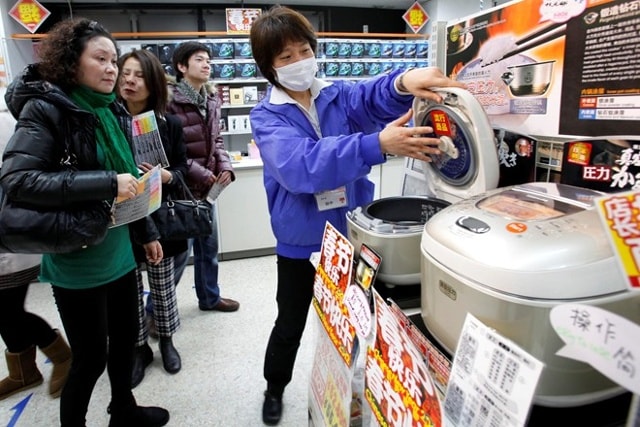Buying by fingerprint in Japan
Since this summer, the Japanese government has been testing a system that allows foreign visitors to confirm their identity and make purchases at supermarkets using their fingerprints.
The Japanese government hopes to boost foreign tourists by introducing a fingerprint payment system that will both deter criminals and save tourists from having to carry cash or credit cards.
The Japanese government aims to operate a fingerprint payment system by the time the 2020 Tokyo Olympics and Paralympic Games take place, the Yomiuri Shimbun reported.
During a trial of the system, domestic travelers will register their fingerprints and other data — such as credit card information — at airports and elsewhere.
After registering, visitors can go through tax exemption procedures and purchase goods by placing two fingers on special devices in stores and supermarkets.
 |
| Customers browse goods in a supermarket in Japan. |
Japan's hotel and inn law requires visitors to show their passports when they check in. The government wants to replace passports with fingerprints.
300 souvenir shops, restaurants, hotels and other businesses will participate in the trial. Those establishments are located in areas popular with foreign tourists - such as the cities of Hakone, Kamakura, Yugawara in Kanagawa Prefecture, and Atami City in Shizuoka Prefecture.
The government will gradually expand the trial period between now and next spring so that the service can appear at tourist spots in the Tohoku region and urban districts of Nagoya city.
Their goal is for the entire country, including the capital Tokyo, to be using the system by 2020.
Establishing a fingerprint payment system is one of the measures the Japanese government is taking to increase the number of annual tourists to 40 million by 2020.
The system is also a way for them to demonstrate the advanced technology of the cherry blossom country.
A government agency will manage data related to how and where foreign visitors use the fingerprint payment system after the data is converted into anonymized form.
After analyzing tourists' travel patterns and spending habits, the government will use the data to outline tourism policies and management strategies for the tourism industry.
However, many people are concerned that tourists will feel uncomfortable providing personal information such as fingerprints. Therefore, during the testing process, experts also looked at ways to manage and protect personal information.
In fact, a bank and an amusement park in Japan are working to turn fingerprints into a payment tool. Last October, the Huis Ten Bosch amusement park in Sasebo City, Nagasaki Prefecture, tested a fingerprint payment system at about 30 stores and restaurants.
“Customers, especially those with children, love the system because it saves them from having to pull out their wallets every time they pay,” said a park manager.
As early as late April, Tokyo-based Aeon Bank will become the first bank in Japan to test a system that allows customers to withdraw cash from ATMs using their fingerprints, eliminating the need to carry a bank card when leaving the house.
“Another advantage of the system is that it increases the level of safety for users, such as preventing the risk of bad guys making fake cards or impersonating our customers to withdraw money,” said an Aeon bank manager.
According to Zing
